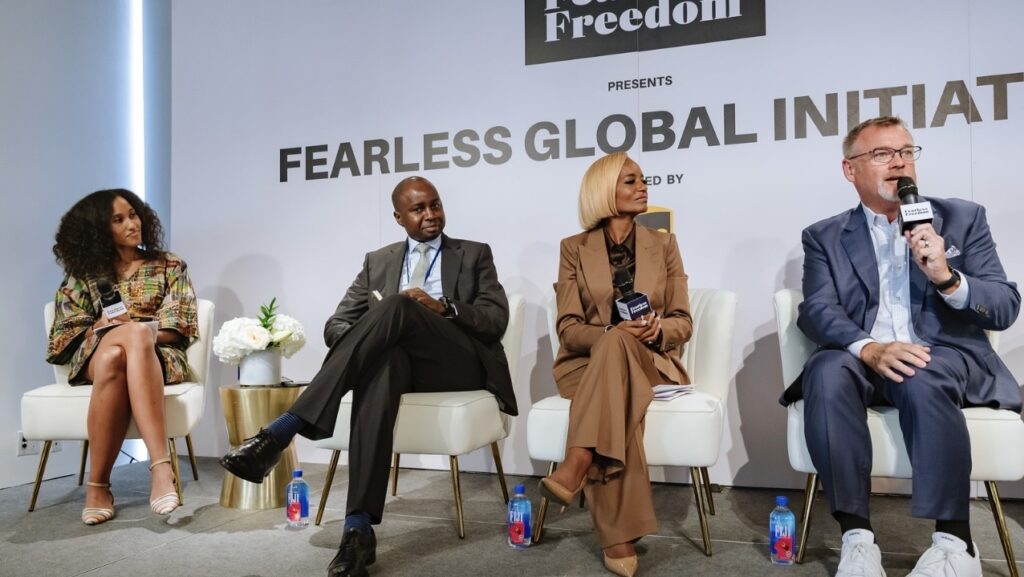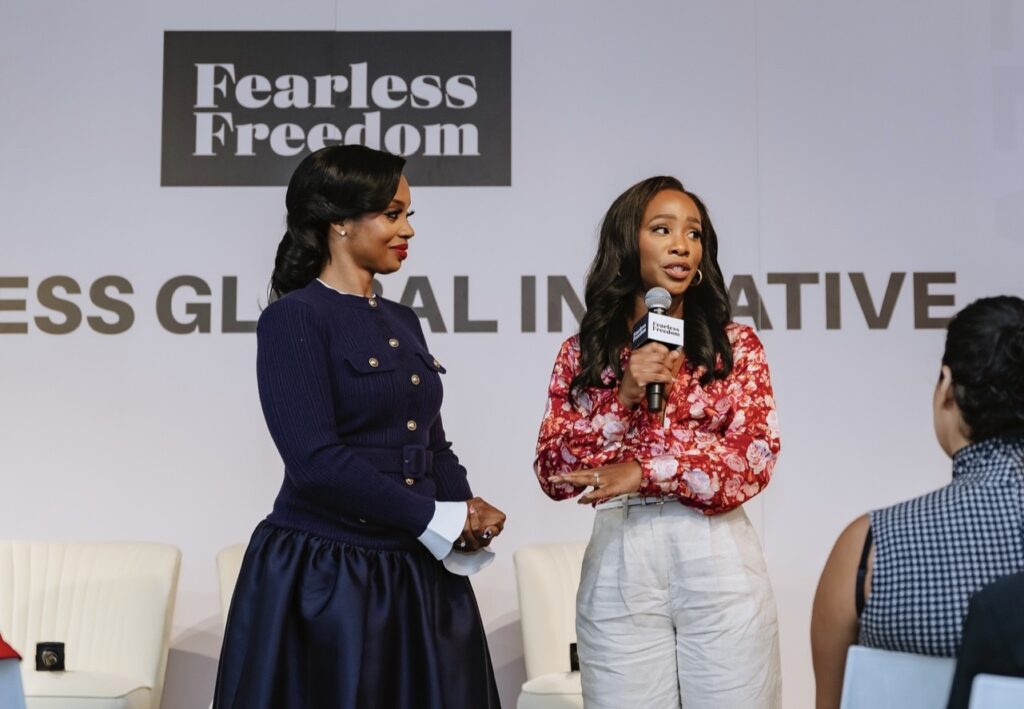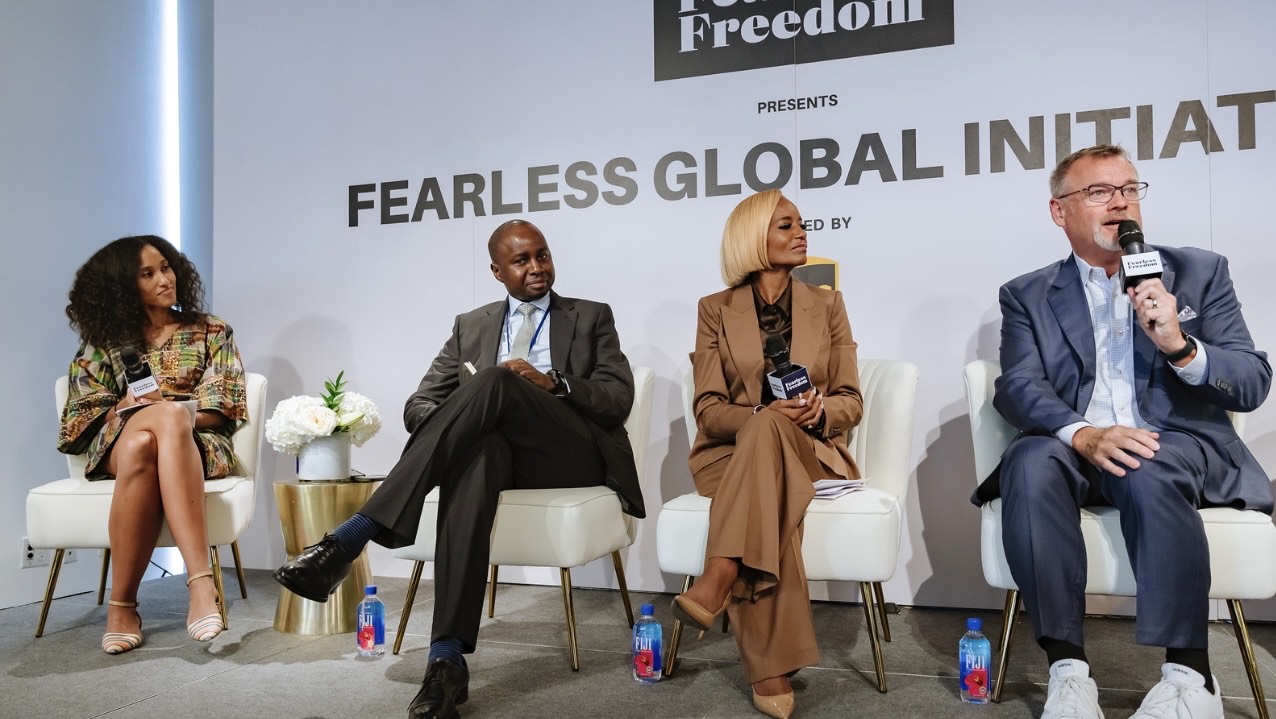NEW YORK – Traffic and bustle connected to the United Nations General Assembly was gripping Manhattan when more than 200 people streamed into a downtown event space. Black women in dresses, blazers, and natural hairstyles, and Black men in suits settled into rows of white plastic chairs.
They chatted about funding and economic empowerment. There were entrepreneurs, investors, influencers, and activists, and among them was a congresswoman, an actress, and a nationally known civil rights lawyer. They were there to support economic independence for Black business women.
“Thirty percent participation is not equity,” Arian Simone, co-founder of the Atlanta-based Fearless Fund, told the group. “If half the population is women of color, then half the funding should be too,” she said.

The Fearless Fund is the venture capital firm that drew national attention for creating grants for Black women entrepreneurs, but also had to shut down the program after a legal attack from the far right. The fund pulled the event together under the heading of the newly formed Fearless Global Initiative.
During the event, Simone announced a plan for Black women entrepreneurs to petition the United Nations for “demographic equity,” a concept that would call on the United States and other countries to invest more in enterprises launched by marginalized groups.
The initiative also would link Black women entrepreneurs across continents, connecting those in the United States with counterparts in Africa, South America, and the Caribbean, Simone said.
The petition proposes specific requirements:
- Nations would audit diversity in contracting, investment and infrastructure practices.
- Legislation would mandate that demographic equity be achieved in government spending.
The ultimate goal would be wealth building which, in itself, can be a form of social resistance, speakers said.
This time in history marks “a critical inflection point” for Black women, U.S. Rep. Jasmine Crockett, D-Texas, told attendees.
“They want us to pretend the past 400 years didn’t happen,” Crockett, an outspoken advocate for Democratic causes, said in reference to the transatlantic slave trade.
Today, economic exclusion can be compared to ongoing courtroom battles against police brutality, civil rights lawyer Benjamin Crump told the meeting.
“Economic justice is a civil right,” he said. “Financial freedom makes all other freedoms more than just a dream.”
Attendees from Africa expressed approval at the prospect of unifying forces.
Christopher Kirigua, Kenyan ambassador, urged those at the meeting to see Africa as an investment destination.
“When you see infrastructure that isn’t the best in the world, what does it tell you? That there is an opportunity to make it better,” he said.
Women entrepreneurs of color face exclusion from capital markets in South Africa, Brazil, and across West Africa, speakers said.
“You are our cousins,” Liberian Minister Sara Beysolow Nyanti told the room. “Your home will always be Africa,” added Beysolow Nyanti, the minister of foreign affairs of the Republic of Liberia.
The need for empowerment is urgent, Nigerian leader Simi Nwogugu said at the gathering. Her initiative, “10 Million African Girls,” seeks to prevent child marriage by equipping girls with entrepreneurial skills.
“When they fight you in the U.S. for investing in Black women,” she said, “please bring that money to Africa.”

Trust and collaboration throughout the diaspora is a needed foundation to economic strategy, said former NBA player and London native Pops Mensah-Bonsu, who left a lucrative career to build a youth academy in Ghana, where his parents are from.
“We can’t have a 100-year plan if Africans and African Americans look at each other differently,” he said.
The restoration of relationships between Africa and its diaspora torn by colonialism is crucial, said Anna Malaika Tubbs, a sociologist and author.
The Fearless Global Initiative meeting took place as Simone’s organization faces ongoing scrutiny over race-conscious business programs.
In August 2023, the American Alliance for Equal Rights, headed by conservative legal strategist Edward Blum, filed a federal lawsuit in U.S. District Court for the Northern District of Georgia contending that the Fearless Fund’s $20,000 grant program for Black women entrepreneurs violated the Civil Rights Act of 1866. The fund discriminated on the basis of race, the suit alleged. In June 2024, a panel of judges with the U.S. Court of Appeals for the Eleventh Circuit ruled 2-1 to block the program, ruling that it likely violated federal civil rights law involving private contracts.
In September 2024, the Fearless Fund reached a settlement in which it agreed to permanently close its Fearless Strivers Grant contest.
At the Manhattan gathering, Simone described the lawsuit as “unnecessary.”
The Fearless Fund and the new initiative served and serve a specific purpose. The financial gaps facing Black women remain significant, according to federal data.
Black women earn 63 cents for every dollar paid to white men, according to the U.S. Census Bureau’s 2023 American Community Survey. They hold less than 1 percent of total U.S. wealth, according to Federal Reserve data, and face disproportionate barriers to credit. Yet they start businesses at higher rates than any other demographic group, according to the Kauffman Foundation’s State of Entrepreneurship report. Globally, the picture is similar.
Venture capital funding remains concentrated in the hands of white male entrepreneurs, with Black women-led startups receiving a fraction of one percent, according to Crunchbase.
The petition being launched by Fearless Global Initiative draws on historical precedent.
In 1947, scholar W.E.B. Du Bois appealed to the United Nations to address what he called the enduring economic consequences of global colonialism. Simone’s petition is similar to that call, arguing that 1.4 billion people worldwide live in extreme poverty, according to World Bank data, many in regions that experienced colonial rule for generations.
International Monetary Fund projections suggest that closing gender labor gaps alone could increase GDP in some countries by 35 percent, Simone noted.
Actress Lexi Underwood, 22, most known for her work in Hulu’s “Little Fires Everywhere,” challenged her peers to move beyond defensive postures.
“We can’t just react to what they’re doing to us,” she said. “We have to build systems that they cannot dismantle.”
UPS, the event’s lead sponsor, pledged to deepen partnerships with Black women-owned businesses, but attendees voiced concern over whether such commitments would hold under political pressure, as other corporations have scaled back diversity initiatives since 2020.
Simone, however, said she sees a way forward.
“We are demanding economic justice,” she said, “and nations can deliver it by first acknowledging the impacts of colonialism.”






